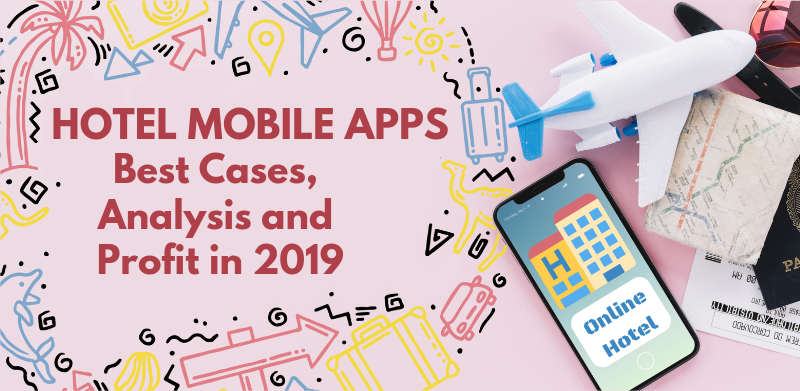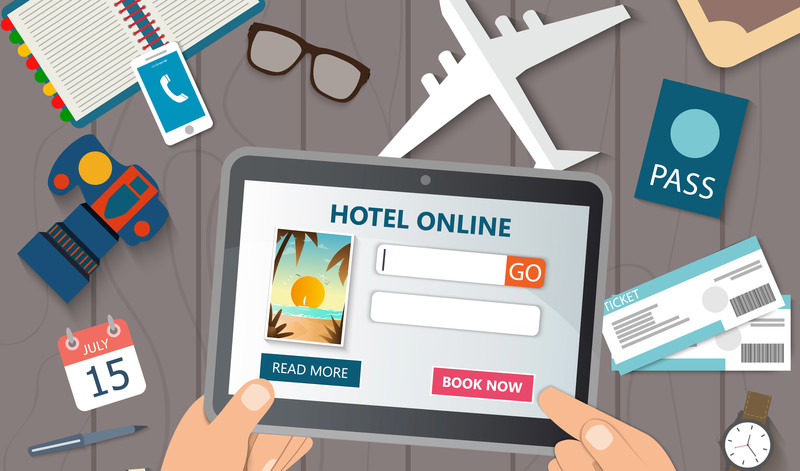In recent years, the philosophy of spending money on experiences instead of things, inspired by the works of the famous American psychologist Thomas Gilovich, increasingly becomes a life’s motto for many people. We believe that the development of digital technologies contributes to such a rapid promotion of tourism: even ten years ago most of us considered only warm countries with resort cities as a destination, now any of us, armed with a smartphone, can go, for example, to the same Kutna Hora, and conduct a tour of local attractions without any outside assistance.

With such unsupervised travels, when you do not use the services of a tour operator, booking a hotel suite becomes one of the main problems. Fortunately, today this problem is completely solved. You just need to install on your smartphone a special application for booking (such as Booking, Expedia or Hotels.com), which just in a couple of clicks will find a room for you with an ideal ratio of price and quality. You can also use branded applications supplied by specific hotel chains, but they are much less popular (after all, we are looking for a comfortable room with a suitable location, rather than choosing a city that has a Hilton hotel, isn't it?). We decided to devote this article to the development of such booking applications because we are sure that in the next ten years they will only increase in popularity.
Core Features and Hotel Booking App Trends
Having analyzed a dozen hotel booking applications, we were able to isolate common elements of design and functionality. Let's get acquainted with each of them in more detail.
- User profile. Most of the applications for booking are personalized, that is, they employ a user profile to provide authorization and personal data storage. This ensures better UX and, thereby, increases user loyalty to the app. Moreover, this creates opportunities to store previous routes, payment card details, as well as hotel loyalty system points.
- Hotel directory. The catalog is perhaps the most important function of your future application. Here you must provide your users with the utmost information: photos of the hotel exteriors and interiors, prices, reviews, special offers, and room availability indicators.
- Mapping. The mapping function must include geolocation routines, which would determine location automatically or allow setting it manually. After filling in the required parameters, the user of the application is presented with a list of current offers with the possibility of ordering by key criteria (number of rooms, their cost, distance from the hotel to the specified location, etc.).
- Room reservation. In fact, this may be a simple button that would allow booking a specific suite in a particular hotel. After a successful reservation, both the user and the hotel operator receive a notification.
- Online payment options. Booking and cancellation are functions that require the withdrawal and refund from the bank card, respectively. To implement them, you need to connect a payment gateway to your application (we recommend using one of the ready-made solutions in order not to bother with PCI standards compliance).
- Push notifications. Push notifications are a great way to inform your current about offers (for example, linked to the user's current location), regardless of whether the app is currently active on the user's smartphone or not.
- Room service ordering. As a bonus feature, you can also provide a button for ordering room service in the application (as suppliers of branded software, produced for a particular hotel chain, usually do).
- Taxi ordering. An equally useful option will be the integration of your software with applications for the taxi ordering (for example, Uber). Or you can go further and implement also a car booking and online purchase of tickets for city sightseeing in your app. It is quite easy to make with third-party APIs such as Rentalcars.com, Getyourguide.com, etc.
- Social media integration. And finally, to ensure the fastest and safest authorization procedure for your users, you can integrate your software with well-known social networks.
The Trendiest Hotel App Features
All of the above is a minimal set of useful features for a hotel booking application. If you want to get into the top of search results on the App Store/Google Play and set trends for other developers, you will have to think about additional features.

Below we are going to describe viable innovative technologies and how can they be implemented in a mobile solution.
- Voice control. Voice controlled software is one of the most innovative features, which allows you to provide a fundamentally new level of user experience. Thanks to it, your users will be able to access the functionality of the application “on the go” - for example, while walking or driving a car.
- Fingerprint identification. This option significantly increases the level of protection of your users' private data. Thanks to this, no one besides the owner of the smartphone can access the application.
- Built-in electronic room key. This feature, as a rule, is an attribute of proprietary software, i.e., it is relevant for hotel chains in which the same room locking system is introduced (using cards with electronic chips) throughout the whole chain.
- VR/AR technology. These two concepts allow providing the users of your software with full-fledged hotel tours, interactive directions, and informational pieces. Of course, to implement a virtual reality technology, you also need special glasses (for example, Google Cardboard).
- Artificial intelligence chatbots. Chatbots will help you provide instant interaction with users, reducing the time to reach the hotel operator. Solutions based on artificial intelligence are considered the most advanced - they are capable of replacing living operators in 9 out of 10 cases.
The Top Five Branded Booking Apps
And now let's get acquainted with the five best branded booking applications, in our opinion, that have significantly helped the companies on whose behalf they were launched to achieve certain commercial goals.
Hilton Honors
Hilton Honors application can be considered, perhaps, the best (and most famous) of this kind of branded software. In addition to the traditional function of room booking, users can also order room service, Uber taxi, and open their suite using a smartphone. The application also has a map with navigation capabilities on the location of more than 700 Hilton hotels located throughout the world.
And, finally, another very useful feature is the system of special offers and bonuses that are accrued to users of the application after each regular booking of a room in a Hilton hotel.
Marriott Rewards
Marriott International’s application offers its users a very profitable loyalty system. In particular, guests of Marriott hotels, who have this software installed on their smartphone, automatically receive the order of magnitude cheaper prices when booking rooms. As they use the app, they also earn points, which at the time of booking can be converted into additional discounts.
But this is not all. Those who resort to using the app on a regular basis are granted the status of a premium client (in particular, such clients gain access to late check-ins and check-outs, bypassing employees at the reception desk).
The application also supports built-in room keys, which means that you can get into your suite even without a keycard. By the way, a completely rebuilt application was released recently, which supports navigation with a single hand.
IHG Hotel Booking & Deals
The IHG app is your personal navigator for the IHG hotel chain, accessible directly from the screen of your smartphone. Thanks to the built-in geopositioning function, you can find the nearest hotel in just a couple of clicks, and even call a taxi using the Uber service. App also provides access to a number of car rental services.
But the advantages do not end there. Wherever you are, if your smartphone is connected to the Internet, you will be able to get acquainted with local attractions, sightseeing, restaurants, and other tourist spots. All of these are supported by real user reviews, so you can choose a place to visit, judging by its rating.
And, of course, this software offers a special bonus accumulation program for registered users.
Hyatt Hotels
The Hyatt Hotels app will help you plan your trip in advance, mitigating your worries about finding a hotel room to stay. It has the option of communicating with the hotel staff, thanks to which you can order food, drinks, and additional items for convenience (for example, pillows) by typing a message.

Through the app, regular visitors get special offers and bonus points. Also, with its help, you can contact Uber to call a taxi at the lowest possible price.
Choice Hotels
The Choice Hotels mobile app will help tourists navigate the terrain and find a nearby hotel. The list of services provided by software includes room reservation, virtual tours of hotel interiors, as well as the possibility of paying for a room and related hotel services directly from the app.
We also must note that the application provides an opportunity to accumulate bonuses that you can spend on discounts - both in the Choice hotel chain and in partner companies.
How Much Does the Hotel App Development Cost?
Let's calculate how much it costs to develop an application for booking with basic functionality (that is, without the use of trendy technological developments, like virtual reality).
- Frontend construction. It will include the creation of a user profile system, catalog, authorization, booking, geopositioning, and payment functions. All these would take at least 540 man-hours.
- UI/UX design. Understandably, here developers should focus on simplicity and intuitiveness, plus, the application should look recognizable. It will take at least 220 hours.
- Backend. Usually, it takes a lot of time (at least 500 hours), especially in cases where the application needs to use personal user data and provide its security.
- And finally, testing. If the customer was satisfied with the result and the developers do not have to redo anything, then testing usually takes at least 200 hours.
The calculation of the minimally required time for the application development equals to 1,460 hours. If this indicator is multiplied by the average rate of outsourcing developers from Eastern Europe, which ranges from $25-55 (in our opinion, this is the most successful way to save on the development of an application without sacrificing quality), you get a budget of $36,500-80,300 (this is without taking into account the cost of server capacity rental and after-release maintenance).
Summary
As you can see, with proper marketing, applications for booking with even quite modest functionality are able to attract a certain audience, not to mention those solutions that are integrated with trendy tech - AR, IoT, chatbots, etc. If you want to launch something like this publicly, contact us at Applikey Solutions! We always strive to surprise our customers and implement in their projects the best possible technological developments for a specific business niche. Contact us right now to discuss all the details of prospective cooperation.







